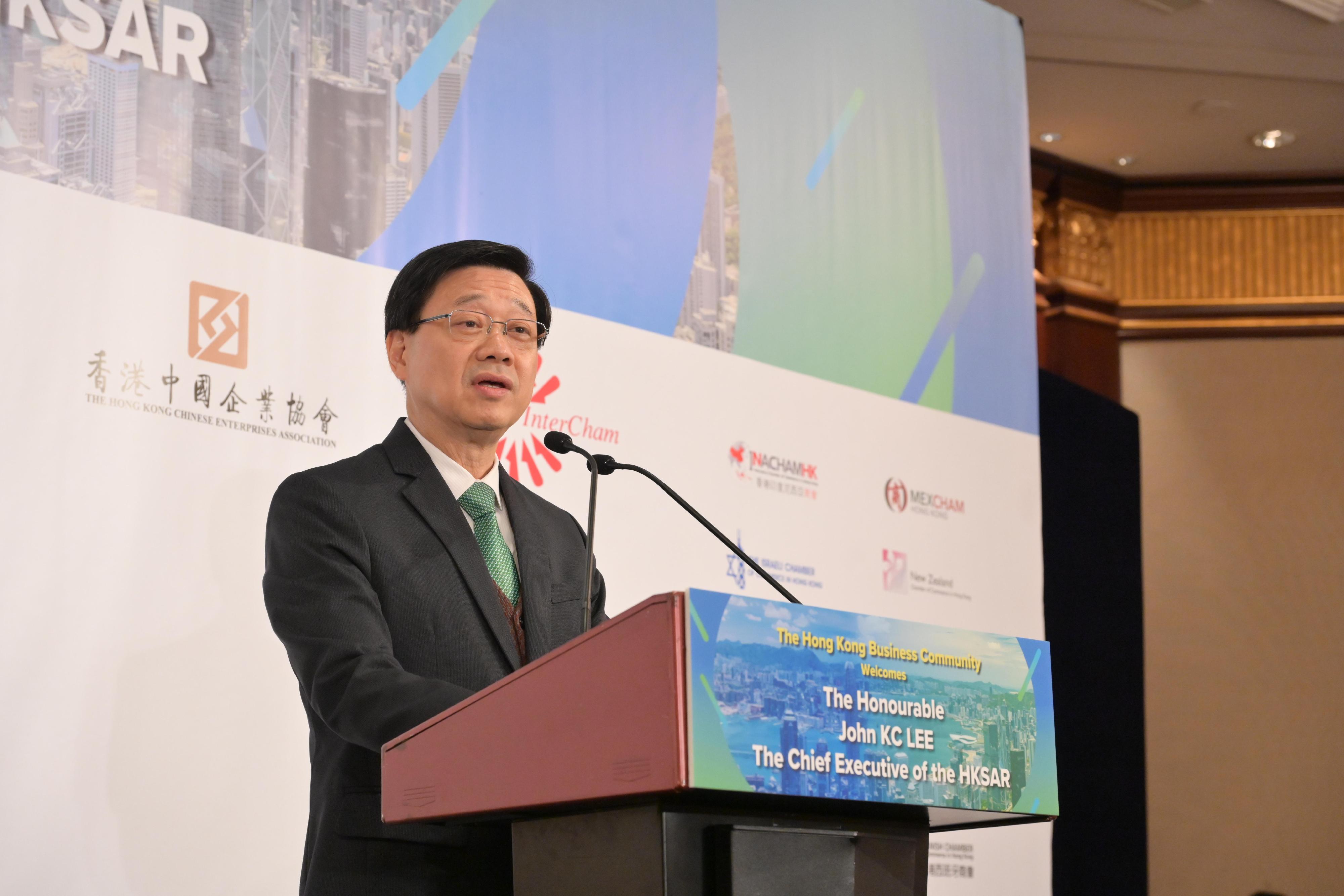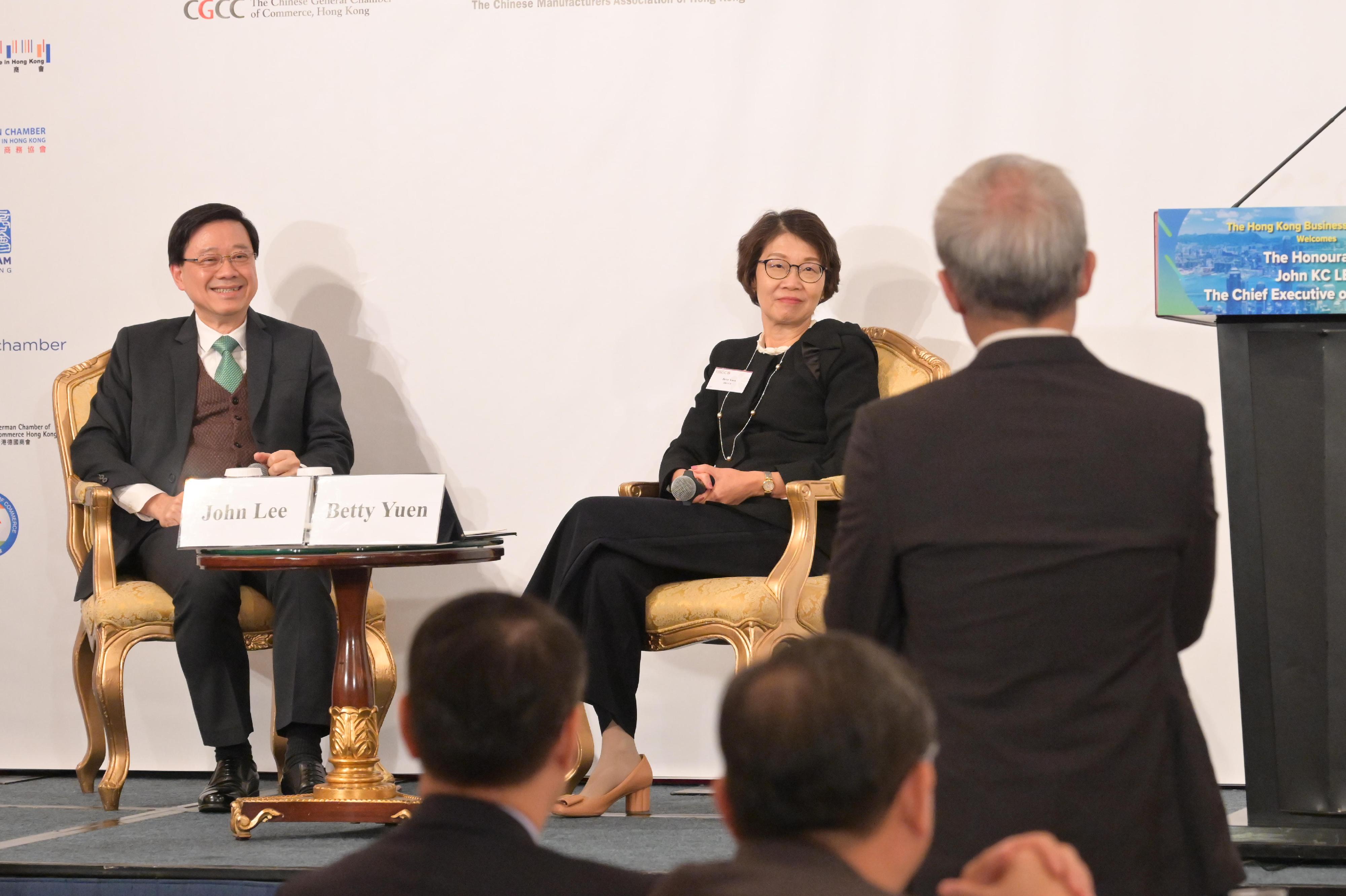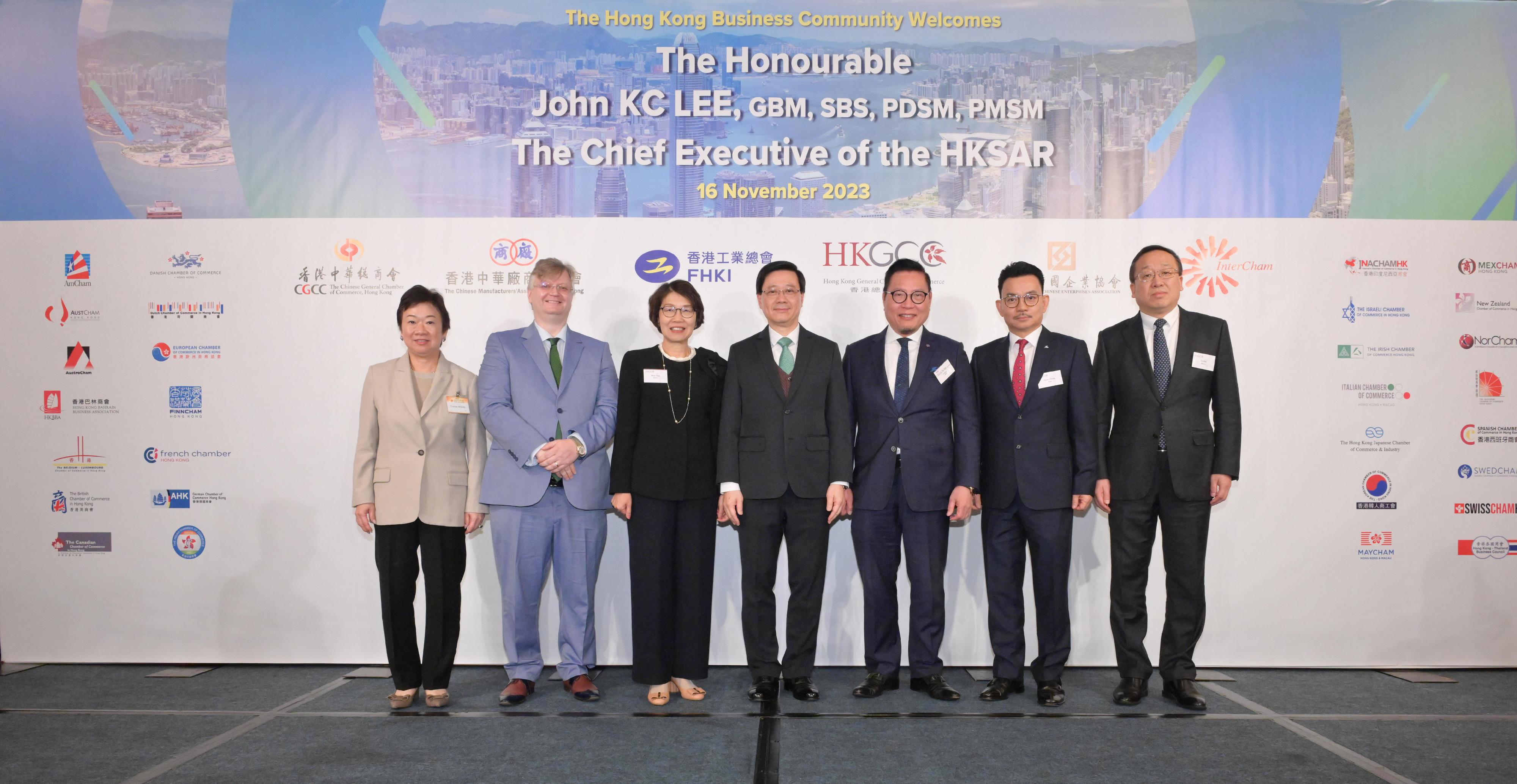Speech by CE at Joint Business Community Luncheon (English only) (with photos/video)
************************************************************************************
Mrs Betty Yuen (Chairman of Hong Kong General Chamber of Commerce), Mr Jonathan Choi (Chairman of Chinese General Chamber of Commerce, Hong Kong), Mr Steve Chuang (Chairman of Federation of Hong Kong Industries), Mr Allen Shi (President of Chinese Manufacturers' Association of Hong Kong), Mr Yu Xiao (Vice Chairman and President of Hong Kong Chinese Enterprises Association), Mr Padraig Seif on behalf of InterCham (President of Irish Chamber of Commerce of Hong Kong), consuls-general, ladies and gentlemen,
Good afternoon to you all. It is my great pleasure to join you all for this traditional post-Policy Address luncheon meeting. For starters, I'm glad to be back here again, after our gathering last year - this time, however, without having to wear a mask.
I announced my Policy Address on October 25. The theme of my Policy Address, is to create "A vibrant economy for a caring community".
In the next 10 to 15 minutes or so - I guarantee you I won't be as long-winded as I was in LegCo - I will highlight some of the key policy areas that are relevant, I think, to our business community, and to the economic vitality of our city.
But first, a brief overview of the current situation.
After a few challenging years, Hong Kong is not only back on the world stage; we are on the centre stage of the world now.
In just the past three weeks since my Policy Address, a series of mega-scale and international events have drawn a variety of policymakers, game-changers and talents from around the world to Hong Kong:
- Last week's second Global Financial Leaders' Investment Summit, for example, was graced by 300 leaders from 160 global institutions, 90 of them group chairmen or CEOs;
- The Hong Kong Legal Week, the Government's flagship event in promoting the rule of law, featured a judicial summit by the UN Commission on International Trade Law, and has attracted over 11 000 participants;
- Another week-long event, the Hong Kong FinTech Week drew an audience of over 30 000 in mapping out the future of fintech; we welcomed leading scientists and researchers from around the world for the Shaw Prize Award Presentation Ceremony, and the inaugural Hong Kong Laureate Forum;
- Meanwhile, sports fans enjoyed the return of the Hong Kong Golf Open and the Harbour Race;
- And needless to say, our popular Wine and Dine Festival has returned to the Central Harbourfront, drawing in 140 000 participants at its gastronomic extravaganza.
The vibrant scenes of inbound tourism and private consumption, in no small part bolstered by our mega events, have given a solid boost to the local economy.
In the third quarter this year, real GDP (Gross Domestic Product) grew by 4.1 per cent year-on-year. Also in the third quarter, private consumption expenditure rose 6.3 per cent from a year ago. Overall investment expenditure rebounded sharply by 18.4 per cent.
That said, our economy is not out of the woods just yet.
We recently revised downwards our 2023 full-year GDP growth forecast to 3.2 per cent, from the previous estimate of between 4 and 5 per cent growth. This, for the most part, reflects external headwinds that we are facing, notably increasing geopolitical tensions and tight financial conditions that may continue to weigh on goods exports and investment sentiment.
Against this backdrop of a mixed and complex global economic picture, I have remained steadfast in my governance blueprint to the principles offered by President Xi Jinping last year under "four musts" and "four proposals" for the current-term SAR Government.
I wish to expand on some of these today.
First is the full and faithful implementation of the "one country, two systems" principle.
President Xi, and indeed many top Central Government officials, have consistently affirmed that "one country, two systems" will remain for the long run. This means that Hong Kong can confidently focus on our role as a value-adding conduit for trade, investment and talent between the Mainland and the rest of the world.
It also means that we can count on the full support of the Central Government, and foster even closer people-to-people, business-to-business and government-to-government links between the Hong Kong SAR and the Mainland. This will ensure confidence and stability. This also helps local and international firms tap into the vast opportunities in the Guangdong-Hong Kong-Macao Greater Bay Area and throughout the Mainland.
At the same time, Hong Kong's tried and trusted systems offer overseas companies a familiar business environment. We provide a level playing field underpinned by a robust common law system, and a judiciary that exercises its powers independently.
The 2023 Rule of Law Index, published by the World Justice Project, ranks Hong Kong 23rd out of 142 countries and jurisdictions - meaning we are ahead of over 80 per cent of the world in this area. We are in the top one-fifth.
As one of the freest economies in the world, and one of the easiest places to do business, Hong Kong not only facilitates business; we also add value for businesses.
Among our value-adding advantages are a raft of free trade agreements signed with 20 economies and investment agreements with 32 economies around the world.
Each and every one of them adds value to business, and boosts business confidence, in one way or another.
We are seeking early accession to the Regional Comprehensive Economic Partnership, or RCEP, and hope to add this, the world's largest FTA (free trade agreement), to our list of free trade partners in the world in the not too distant future.
In business, as in government, results count. As you all know, I champion a result-oriented approach in public administration. I am happy with the progress that we have made in cultivating a result-oriented culture within the Hong Kong SAR Government. This is a core element of further improving governance, as mentioned by President Xi last year.
As well as result-oriented, we are also industry-oriented. In fact, the terms "industry-oriented" and "industry-driven" appear in the 2023 Policy Address a total of eight times.
This underlines our determination to create the right environment for industries of strategic importance to blossom. Industries such as innovation and technology, creative industries, pharmaceutical research and development, Chinese medicine and new energy transport, among others.
We are also making good progress in attracting strategic enterprises to Hong Kong. The Office for Attracting Strategic Enterprises, or OASES, has already achieved positive results.
So far, OASES has made contact with over 200 strategic enterprises around the world, of which 30 are planning to establish their foothold or expand their operations in Hong Kong. This represents a total of more than $30 billion of new investment in Hong Kong, and the creation of about 10 000 jobs.
With the industry-oriented approach in mind, we will enhance the business environment to develop our headquarters economy.
Hong Kong already has many competitive advantages for Mainland and overseas companies to establish their headquarters. We are a sophisticated and well-connected international city that aligns with global standards and values.
At last count, around 9 000 companies from the Mainland and overseas had established operations in Hong Kong, and among them, over 1 400 operate as regional headquarters.
We will explore with the relevant Central Authorities measures to facilitate Mainland enterprises in setting up headquarters or corporate divisions in Hong Kong.
We are also encouraging more companies to re-domicile in Hong Kong, in particular those with a business focus in the Asia-Pacific region. We will enable non-local companies to re-domicile here, while maintaining their legal identity and operational continuity.
I am confident that with our robust company governance regime, and secure and dynamic business environment, offshore companies will consider us a good destination for re-domiciliation.
We have already put in place a user-friendly fund re-domiciliation mechanism for Open-Ended Fund Companies and Limited Partnership Funds, to facilitate existing foreign funds to establish and operate in Hong Kong.
As well as attracting investment, the Government makes no secret of its intention to trawl the world for top talent to come to Hong Kong, and contribute to the city's development. We want to bring you, our treasured businesses, the top minds from around the world, to fuel your development plans and next era of success. You will no doubt be familiar with the various talent attraction schemes available. Allow me to update you on some latest developments.
First, our enhanced talent attraction schemes have attracted over 180 000 applications in the first 10 months of this year. Over 110 000 of them have been approved, and some 70 000 talents have already arrived in Hong Kong. This has doubled our annual target of attracting 35 000 talents. In the result-oriented philosophy, this is clearly an overachievement.
For the Top Talent Pass Scheme launched last year, we have added eight more top-ranked institutions under the scheme. That means eligible graduates from 184 institutions on the Mainland and around the world may apply to stay in Hong Kong for two years.
The Scheme received some 55 000 applications from December 2022 to October this year, of which over 43 000 have been approved. And these are the top talents of the world.
Among them is, as has been reported in the news, former NBA basketball star Stephon Marbury, who intends to use his huge talent and experience to support the development of the sport in Hong Kong, and especially to encourage youngsters to enjoy sport. We welcome Mr Marbury and all the other successful applicants with open arms.
In fact, Mr Marbury visited our recently opened physical office of Hong Kong Talent Engage, as part of his application process. His application is a vote of confidence in Hong Kong. It is also an example of how the new physical Hong Kong Talent Engage office can strengthen support for prospective talent to come to Hong Kong under various attraction schemes.
I also announced in the Policy Address that foreign staff of companies registered in Hong Kong can now apply for a multiple-entry visa to the Mainland. This will ensure, and will surely facilitate cross-boundary business travel, and make our city all the more attractive to overseas companies. We have also relaxed visa policies for talent from Vietnam, Laos and Nepal.
Currently, we are gearing up to implement the Capital Investment Entrant Scheme. Under the scheme, eligible investors with investments of $30 million or above, excluding real estate, can apply to reside and pursue development here.
Ladies and gentlemen, we have been working hard to improve governance, boost our business environment and encourage investment and talent to Hong Kong.
We have achieved some good results in a relatively short period of time. We also need to look, plan and set targets for our city's longer-term growth and economic capacity. This brings me to the Northern Metropolis.
The scope, complexity and potential of the Northern Metropolis are all huge. Here are some factoids that demonstrate the scale of the Northern Metropolis:
It covers an area of some 30 000 hectares, about one-third of Hong Kong's total landmass.
Upon full development, it will be home to about 2.5 million people and create some half a million jobs, many of them in the I&T (innovation and technology) fields.
The San Tin Technopole will be a core part of the I&T zone, providing about 300 hectares of land for I&T uses. To give some perspective, the I&T-related land use will be capable of providing a gross floor area of about 7 million square metres, which is roughly equivalent to 17 Hong Kong Science Parks.
Of course, the Northern Metropolis is a long-term development plan to be completed over decades. But it is vital for Hong Kong's future and we have already made a strong start.
Last month, we published the Northern Metropolis Action Agenda. This Action Agenda goes far beyond the grand vision of this project, and delves into the details. These include conceptual boundaries for four related industrial zones, namely high-end professional services and logistics hub; innovation and technology zone; boundary commerce and industry zone; and blue and green recreation, tourism and conservation circle.
I would encourage you to study the Action Agenda, and consider ways that your companies can contribute to and capitalise on this long-term and vital development for our city's future.
That future, ladies and gentlemen, is bright, and opportunities are bountiful. But like the Northern Metropolis, or any other development projects, it starts with a firm belief in bringing out the best of our shared community.
Seated here today are the top leaders of Hong Kong's world-renowned business community. You will all be aware that the upcoming District Council election is scheduled to take place on December 10, no less because many of the 399 candidates are from the commerce and industry circles, and they are as keen as you and me, in paving way for a better Hong Kong.
I, therefore, would like to appeal to all of you to cast your vote in the election, and cast a vote of confidence in a brighter future for Hong Kong.
On that note, I wish you all and your businesses will be successful in the many years to come, and an enjoyable lunch gathering. Thank you very much.
Ends/Thursday, November 16, 2023
Issued at HKT 17:02
Issued at HKT 17:02
NNNN





